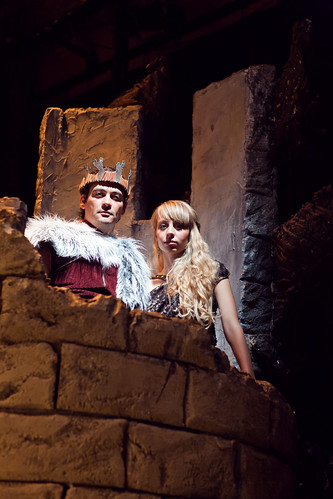Ham and jam and Camelot
 Lancelot (Wilson Jermaine Heredia, kneeling), King Arthur (Johnny Moreno, holding the sword) and Guenevere (Monique Hafen, right) take part in a knighting ceremony in the San Francisco Playhouse production of Camelot. Below: Royalty in a tower: Moreno and Hafen look down on the simple folk. Photos by Jessica Palopoli
Lancelot (Wilson Jermaine Heredia, kneeling), King Arthur (Johnny Moreno, holding the sword) and Guenevere (Monique Hafen, right) take part in a knighting ceremony in the San Francisco Playhouse production of Camelot. Below: Royalty in a tower: Moreno and Hafen look down on the simple folk. Photos by Jessica Palopoli
I never loved Camelot, not ever once in silence. Not in the lusty month of May. Never. And I wanted to because how could you not love the work of Alan Jay Lerner and Frederick Loewe, the guys who created the masterwork known as My Fair Lady? I'm also genetically inclined emotionally hard wired to love anything involving Julie Andrews, who followed up her star-making turn as Eliza Doolittle by playing the placid Guenevere in Lerner and Loewe's adaptation of the King Arthur stories as told in T.H. White's The Once and Future King. But the fact is that the role of Guenevere, like the show in which she's stuck, is a big drag.
The songs are corny and prissy and all wrong for a story of passion and chivalry and civil justice in bloody dark ages. In fact, Lerner and Loewe were all wrong for this story. They wrote Camelot as if still in the mists of George Bernard Shaw. There's no blood and guts here, no red-hot love, no edge, which is interesting for a show with so much swordplay. It's as if the passion is under glass in Camelot – you can see it, you just can't access it, not through the music (which often feels like warmed over operetta), not through creaky book and lyrics (which are too clever and wordy by half).
Every production of Camelot I've ever seen suffers from the same problem. Because the show itself is so clunky, even the most professional of productions come across as mediocre community theater crossed with a Disney princess parade with a little Renaissance Pleasure Faire thrown in for kicks.
How exciting, then, to hear that San Francisco Playhouse was going to re-imagine Camelot as something darker and grittier. Director Bill English got permission to tweak the book and add in two cut songs, "Fie on Goodness" sung by the Knights of the Roundtable and Mordred, King Arthur's bastard son (and a bastard in general), and "Then You May Take Me to the Fair" sung by Guenevere as a way of riling up the knights to give Lancelot the smackdown he so richly deserves.
For all of English's efforts, it's still Camelot. The actors do their best to infuse some fire into the script, but Lerner defeats them at every turn. English has banished the twee flourishes that make the show ridiculous, but the central love triangle of King Arthur (Johnny Moreno), Guenevere (Monique Hafen) and Lancelot (Wilson Jermaine Heredia) still comes off as sorely underdeveloped.
The role of Mordred (Paris Hunter Paul) has been beefed up a bit but manages to remain a comic book bad guy who feels like he was thrown in at the last minute.
Nina Ball's set gives us plenty to look at for 2 1/2 hours – castle towers, ruins, grassy hillsides (complemented by scenic projections at the back of the stage designed by Micah J. Stieglitz). And the fights are all grandly staged by Miguel Martinez and fiercely enacted by the actors.
Still and all, it's Camelot, and that's not such a good thing. Moreno has some affecting moments as the conflicted king, although Lerner's ham-fisted dialogue tends to bring out Moreno's inner Shatner. Hafen makes the most of Guenevere, but the role doesn't ask for much more than anger, boredom and guilty passion. Heredia, who's a long way from his days as Angel in Rent here, does everything he can to make Lancelot likeable in spite of his obsession with virtue and valor. Heredia is warm and appealing, although he seems hesitant in his big number, "If Ever I Would Leave You," even though he has a beautiful voice.
Charles Dean opens the show on a lighter note as Merlyn, who is outfitted by costumer Abra Berman in a hilarious antler-tinged outfit with a bare midriff and a codpiece thrusting out into the audience. It's such a funny moment that hopes are raised: perhaps this will be the Camelot that doesn't take itself so very seriously. But no. Dean reappears later as an energetic Pelinore friend and defender to the king, and Merlyn is sorely missed.
Music director Dave Dobruksy and his quartet sound great (and make a brief appearance via video at the top of the show). The arrangements are refreshingly straightforward and aim to remove the preciousness that can make the score even more treacly than it already is.
But. It's still Camelot, and though this is the most interesting and thoughtful version of the show I've seen, I should just accept the fact that I'll never be a fan and leave it at that.
FOR MORE INFORMATIONCamelot continues through Sept. 14 at the San Francisco Playhouse, 450 Post St., San Francisco. Tickets are $30-$100. Call 415-677-9596 or visit www.sfplayhouse.org.
